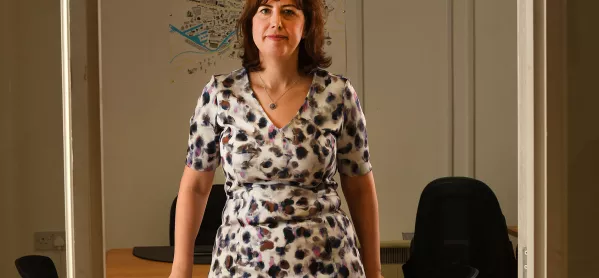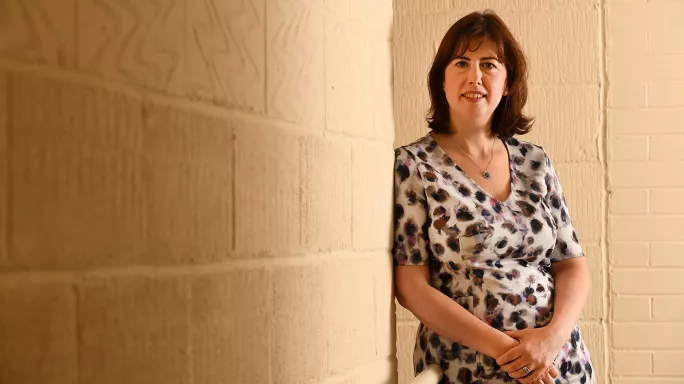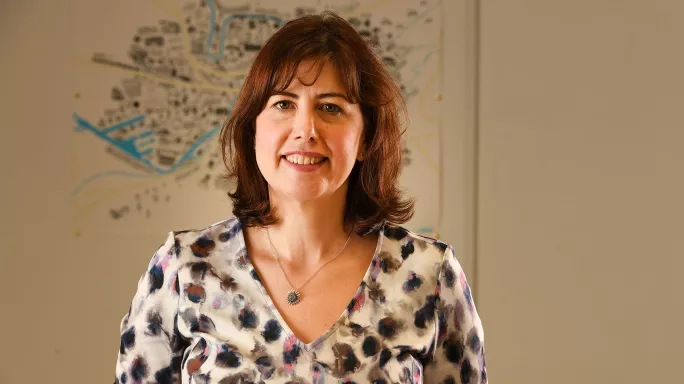- Home
- Lucy Powell: ‘The academic pendulum has swung too far’
Lucy Powell: ‘The academic pendulum has swung too far’

Looking back on her own education, Lucy Powell MP remembers a system that failed too many of her generation.
“Everyone fell through the net really. A lot of people I was at school with played truant. It almost felt like it was optional going to school,” she says.
“I would sometimes find myself in a class of five or six. It was that sort of era. There wasn’t the same emphasis on rigour that there is now.”
She credits successive governments for raising the importance and the quality of education within schools since then.
But now she fears that the policy focus pushing academic standards has “swung the pendulum too far the other way” and it is creating a new set of problems for schools.
Report: MPs warn of a ‘wild west’ exclusion system
Background: Ten things we know about Lucy Powell
Funding: MP welcomes boost for nursery schools
Powell, 44, speaks as someone who has had involvement in education policy for at the least the past five years.
She was on Labour’s frontbench as shadow education secretary, has been a member of the Commons Education Select Committee for almost two years and is now the political lead behind a drive to ensure the school readiness of children across Greater Manchester.
Teachers and heads in the family
Education has been central to Powell throughout her political life - and she dates her enthusiasm for politics back to her days in primary school.
Growing up in Manchester, her father was a trade union shop steward and local election agent for the Labour Party - at a time when the Manchester was “the vanguard of the left”.
At just nine years old, she was despatched, wearing a red rosette, to the polling station as a teller.
And at 15, she joined the Labour Party.
The city she remembers from her childhood is very different from the one she represents as Manchester Central MP today.
“Manchester now is very happening and trendy but the part of the city that I grew up in, which these days is considered to be the posher bit of Manchester, well it wasn’t then. It wasn’t at all,” she says.
“I could see how unfair it was for most of my peers who were not getting much out of school and whose lives were going to be different to mine. That is where a lot of my politics started from.”
Her family also have a strong education background. When asked who in her family teaches, it is quicker for her to list those who don’t.
Her mother was a headteacher and a multi-academy trust leader. Her uncle, her granddad and two of her aunts were or are also heads - one of whom, Anna White, received a CBE for services to education for helping to secure improvements at the infamous The Ridings School, in Halifax, in the late 1990s.
Reflecting on her own education, she describes herself as one of the lucky ones.

She excelled at school and while studying at Xaverian College in Manchester, she was encouraged to apply to the University of Oxford, a process she found somewhat unsettling.
“When I went for the interview, I hated it,” she remembers.
“It was all very alien and posh. I remember phoning my mum and I was a very independent 17-year-old who had two jobs already and my own life, and I don’t think I had cried to my mum since I was about 5 but I cried on the phone to say how awful it was.
“And then I got an offer - which was the worst thing because I didn’t want to go but there was quite a lot of pressure to go. It was a big deal for the college and for my family.
“I got the A-level results I needed and I was on this trajectory to go to Oxford.”
Why I quit Oxford
If securing a place at Oxford was a big deal, then giving it up was to be even bigger.
But after a year studying at Somerville College, she decided to leave Oxford and moved to King’s College London to complete her studies.
She said: “I did a year, which I hated…it just was not for me. Oxford was not for a state-school girl from the North doing maths and chemistry. I was like a duck out of water.”
Giving up her place meant she had to support herself through the rest of her higher education, but she describes the move “as the best thing she ever did”.
“I loved it at King’s. Loved it. They made me feel clever again. They made me feel really valued,” she says.
“But it was all of those things: my experience of school, my experience of growing up in Manchester in that era of education and my experience of going to Oxford and seeing how the other half really did live that very much shaped my politics about equality and opportunity in education but also around rigour and standards.
Focus on educational standards
“You have got to ensure that everybody does well at school and there is a system in place to ensure that, which wasn’t the case in the 1980s.”
She says that “any objective assessment” of the education system would find that it is far better today than it was in the late 80s because of a focus on improving standards and investment.
Powell, who is married with two children and a stepchild, reveals that her children attend the same schools she did growing up but says these institutions are unrecognisable from her days.
“I think under successive governments there have been huge strides in education in terms of its importance, the understanding of good practice and that being widely shared, in terms of standards and accountability…education is just vastly better today than it used to be. We should be collectively proud of that, but I think some things have gone too far now.
“Some things that start out as good ideas then become seen as this panacea.”
As shadow education secretary in 2015, she opposed then education secretary Nicky Morgan’s unsuccessful plan for every state school to become an academy. She also called for academies to be brought under local authority control.
‘Ridiculous’ tests
Today, she remains concerned about the unintended impact of education policies.
“With testing and the data-driven approach, the pendulum starts to swing too far the other way,” Powell says.
“Whereas in the past there was concern that you might have been able do whatever you want, teach whatever you want, that has been addressed.
“But now it’s gone too far with ridiculous Spag [spelling, punctuation and grammar] tests in primary schools or pupils failing exams if they spell a couple of things wrong.
“You have got to the position where policy keeps pushing and pushing but are we expecting to have identikit kids when we are saying, ‘All schools should teach these subjects in this way. Everyone needs to take them and everyone needs to do this handful of GCSEs.’
“And whereas 25 years ago schools might have been more focused on creativity and personal expression, now it has gone the other way. We have made huge strides but we are in danger of going way too far with it and we need to get that pendulum to swing back.”

“I think it’s all part of the same piece about some of the joy having gone out of educating students because it is all a bit identikit.
“It’s becoming overprescribed and micro-managed. And that is the same for teachers as well. Some of the joy has gone out.
“Then you add in the funding pressures. Not just funding of schools but ancillary things as well.
School funding and poverty
“I have spoken to teachers who are having to bring food in and give clothing to some of their students and so on. It’s not just the funding challenges in school but the whole poverty, deprivation agenda and that is such a challenge.
“If you’re a teacher who is then being judged on the number of kids who pass a Spag test or a really hard new GCSE, but you know that those kids aren’t actually being fed properly or not being clothed then it’s not a great atmosphere and it can feel a bit draconian.”
Powell left the frontbench education role after less than a year, resigning over concerns about Jeremy Corbyn’s leadership back in 2016.
But she believes that she has been able to achieve more in education from the backbenches.
“In a hung Parliament, as a backbencher, I have found that I can shape things more than I could. You can build alliances and work across parties.
“One example would be getting more money for maintained nursery schools, which, as a frontbencher, you would never be able to do because it’s a bit ra-ra, it’s Punch and Judy; you are a pure politician when you are on the frontbench, whereas, as a backbencher, you are more of a classic parliamentarian.”
Powell is also keen to talk about her work helping to produce reports and hold power to account in the Commons Education Select Committee.
“I have got a really good relationship with the chair, Robert Halfon. We don’t have much that we disagree with on education. He leads by example and we really give people a good old roasting if we need to,” she says.
“Sometimes it’s the accountability sessions. We have given [education minister] Lord Agnew and [former education secretary Damian] Hinds a rough ride.”

She believes the most important work she has been involved with to date was the select committee’s report on alternative provision and “hidden” exclusions.
“It has been quite agenda-setting. It wasn’t picked up massively at the time but it was agenda-setting and those issues are now mainstream. We are really proud of that.”
But Powell’s work in education is not confined to Westminster.
Early Years
She is also the political lead for a drive to make sure that children across Greater Manchester are ready for school, having been appointed by Labour mayor Andy Burnham.
She is now helping to lead an Early Years Workforce Academy, which will aim to improve the training and support of staff working in early years settings across Greater Manchester.
“Investing in our early years workforce is essential to give children in Greater Manchester the best start in life,” Powell says.
“In early years we kind of understand what needs to be done but not everyone knows how to do it well and not everyone is doing it, not everyone is pulling in the same direction.
“The Early Years Workforce Academy will allow us to spread expertise, and share resources. It has the potential to transform our approach to early years in Greater Manchester.”
Powell was driven to get into politics because she wanted to improve the life chances of people growing up in her home city.
She tells Tes she believes that her role in early years could really help to achieve this.
CV: Lucy Powell
- Attended Beaver Road Primary, Parrs Wood High and Xaverian College in Manchester
- Studied chemistry at Somerville College, Oxford, and then King’s College London
- Campaign director for Britain in Europe
- Managed Manchester Endowment fund for Nesta (the National Endowment for Science, Technology and the Arts)
- Led Ed Miliband’s Labour Party leadership campaign
- Elected MP for Manchester Central in 2012
- Shadow minister for the Cabinet Office, 2014-15
- Shadow education secretary, 2015-16
- Commons Education Select Committee member, 2017-present
Keep reading for just £1 per month
You've reached your limit of free articles this month. Subscribe for £1 per month for three months and get:
- Unlimited access to all Tes magazine content
- Exclusive subscriber-only stories
- Award-winning email newsletters



